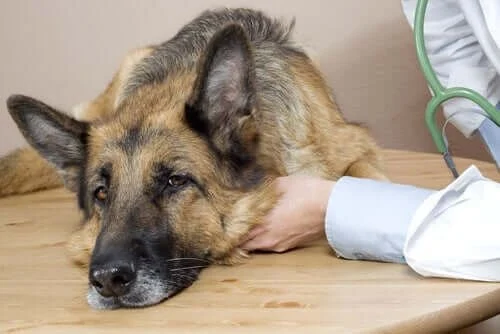
How to Recognize Illnesses Before They Get Serious in Pets
- Why Early Detection of Illnesses in Pets Is Key
- Common Signs of Illness in Pets
- Recognizing Disease-Specific Symptoms in Pets
- When to See a Veterinarian for Your Pet’s Illness
- Real-Life Example: Catching an Illness Early in a Pet
- Tips for Keeping Your Pet Healthy and Preventing Illness
1. Why Early Detection of Illnesses in Pets Is Key
Pets can be great at hiding their discomfort, and sometimes the symptoms of illness are not immediately noticeable. This is why early detection of illnesses is crucial in keeping your pet healthy. By recognizing symptoms early on, you can intervene before the condition worsens, leading to more effective treatment and better outcomes for your pet.
Pets who are not feeling well may not show obvious signs at first, so being proactive and observant is key. Catching illnesses in their early stages can prevent complications, avoid costly treatments, and ensure your pet lives a longer, healthier life. Understanding common signs of illness and knowing when to take action can make a significant difference in your pet's health.
2. Common Signs of Illness in Pets
There are several general signs that may indicate your pet is not feeling well. These symptoms can vary depending on the type of illness, but some common signs include:
- Changes in Appetite or Water Intake: If your pet suddenly stops eating or drinking, or if they drink excessively, it may be a sign of illness. Loss of appetite can be associated with conditions like infections or digestive issues, while excessive drinking might indicate kidney disease or diabetes.
- Behavioral Changes: If your pet becomes more lethargic, withdrawn, or unusually aggressive, it could be a sign of discomfort or illness. Sudden changes in behavior, such as restlessness or irritability, are red flags that shouldn’t be ignored.
- Vomiting or Diarrhea: Occasional vomiting or diarrhea can be normal, but frequent or persistent symptoms could indicate an underlying health problem. If your pet experiences ongoing gastrointestinal issues, it’s important to consult with a vet.
- Coughing or Difficulty Breathing: Persistent coughing, wheezing, or trouble breathing may signal respiratory issues such as asthma, heart disease, or infections. These symptoms require immediate veterinary attention.
- Changes in Coat or Skin: A dull, dry coat or increased shedding could be a sign of nutritional deficiencies, allergies, or a thyroid disorder. Itchy, inflamed skin or hot spots could indicate an infection or flea allergy.
- Unexplained Weight Loss or Gain: Sudden weight changes can be a sign of various conditions, from diabetes and cancer to thyroid problems or digestive issues. Keep track of your pet’s weight to spot any unusual changes early.
By regularly monitoring these common signs and keeping an eye on your pet's behavior, you can recognize early indicators of potential illness before they become serious problems.

GoodVets Buckeye
19591 W Indian School Rd Suite 105, Buckeye, AZ 85396, USA
3. Recognizing Disease-Specific Symptoms in Pets
Certain conditions in pets have more specific symptoms that may be easier to spot once you know what to look for. Understanding the disease-specific signs can help you identify illnesses early. Here are some examples of common diseases and their associated symptoms:
- Arthritis: Pets with arthritis may limp, have difficulty standing up or climbing stairs, or show reluctance to play or go for walks. Stiffness after rest and joint swelling are also common signs.
- Diabetes: Pets with diabetes may drink excessively, urinate more frequently, lose weight despite a good appetite, or appear lethargic. These symptoms often develop gradually.
- Heart Disease: Symptoms of heart disease in pets include coughing, difficulty breathing, fainting, or reduced exercise tolerance. If your pet has a heart condition, they may also develop swelling in the abdomen or legs.
- Kidney Disease: Kidney problems can cause increased thirst and urination, weight loss, poor coat condition, and vomiting. Pets with kidney disease may also have a bad breath odor or become more tired than usual.
- Cancer: Cancer in pets can cause weight loss, lumps, changes in appetite, or persistent wounds that don't heal. Early detection can dramatically improve the chances of successful treatment.
By being aware of these specific symptoms, you can catch more serious conditions early and seek treatment before the illness progresses to a critical stage.
4. When to See a Veterinarian for Your Pet’s Illness
If your pet exhibits any of the signs or symptoms mentioned above, it's important to consult with your veterinarian promptly. In some cases, early treatment can prevent serious complications. You should take your pet to the vet if:
- The symptoms persist for more than a day or two, or if they worsen over time.
- Your pet is in obvious pain, shows discomfort, or is unable to perform basic activities like eating or walking.
- Your pet has a high fever, vomiting, or diarrhea that lasts longer than 24 hours.
- Your pet has trouble breathing or shows signs of distress that are not typical for them.
- You notice any new or unexplained symptoms, such as lumps, changes in eyes or nose, or seizures.
When in doubt, it’s always better to err on the side of caution and consult your veterinarian. Early intervention can often prevent more serious health issues and lead to a quicker recovery.
5. Real-Life Example: Catching an Illness Early in a Pet
Take the case of Rex, a 7-year-old Boxer who was known for being energetic and playful. However, his owner, Laura, noticed that Rex had started to slow down and seemed less enthusiastic about his daily walks. He was also drinking more water than usual. Laura immediately consulted with her vet, and after some tests, Rex was diagnosed with early-stage kidney disease.
Because Laura caught the symptoms early, Rex started treatment right away. His vet prescribed a special diet and medication to help manage his condition. Over time, Rex’s energy levels improved, and he regained some of his former playfulness. If Laura had waited until Rex’s symptoms worsened, the outcome could have been much different.
This real-life example underscores the importance of paying attention to subtle changes in your pet's behavior. Early detection led to timely intervention, which significantly improved Rex’s health and quality of life.
6. Tips for Keeping Your Pet Healthy and Preventing Illness
Prevention is always better than cure. To help your pet stay healthy and reduce the risk of illnesses, here are some key tips:
- Regular Vet Checkups: Routine veterinary visits are essential for catching health problems early. Annual or semi-annual exams can help your vet detect underlying conditions before they become serious.
- Maintain a Healthy Diet: Ensure your pet is on a balanced, nutritious diet tailored to their age, breed, and health needs. A healthy diet supports your pet's immune system and overall well-being.
- Exercise and Mental Stimulation: Regular physical activity and mental stimulation are key to maintaining your pet's health. Keeping your pet active helps prevent obesity and other related health issues.
- Monitor Your Pet’s Behavior: Keep a close eye on any changes in your pet's behavior, appetite, or energy levels. Being proactive and observant is the best way to spot illness early.
- Provide Preventive Care: Use flea, tick, and worm preventatives as recommended by your vet. Keeping up with vaccinations and parasite control can prevent many illnesses.
By following these tips and staying vigilant, you can help ensure that your pet remains healthy and happy for many years to come.








 Princeton Veterinary Hospital4.0 (821 reviews)
Princeton Veterinary Hospital4.0 (821 reviews) Thomas Ridge Kennels4.0 (17 reviews)
Thomas Ridge Kennels4.0 (17 reviews) All Creatures Animal Hospital4.0 (354 reviews)
All Creatures Animal Hospital4.0 (354 reviews) Fatty Paws Pet Boutique0.0 (0 reviews)
Fatty Paws Pet Boutique0.0 (0 reviews) CityVet | Lone Mountain Veterinary & Urgent Care4.0 (104 reviews)
CityVet | Lone Mountain Veterinary & Urgent Care4.0 (104 reviews) Petnificent Picks5.0 (1 reviews)
Petnificent Picks5.0 (1 reviews) How to Transition a Senior Pet to Easier-to-Eat Food: A Comprehensive Guide
How to Transition a Senior Pet to Easier-to-Eat Food: A Comprehensive Guide The Hidden Dangers in Common Pet Supplies: What You Need to Know
The Hidden Dangers in Common Pet Supplies: What You Need to Know Managing Chronic Conditions in Pets: Essential Diet, Medication & Lifestyle Tips
Managing Chronic Conditions in Pets: Essential Diet, Medication & Lifestyle Tips How to Build a Pet Emergency Kit: Essentials You Need
How to Build a Pet Emergency Kit: Essentials You Need Best Practices for Pet Grooming Frequency by Breed: Keeping Your Pet’s Coat Healthy
Best Practices for Pet Grooming Frequency by Breed: Keeping Your Pet’s Coat Healthy The Effect of Seasonal Allergies on Pets & How to Help
The Effect of Seasonal Allergies on Pets & How to Help